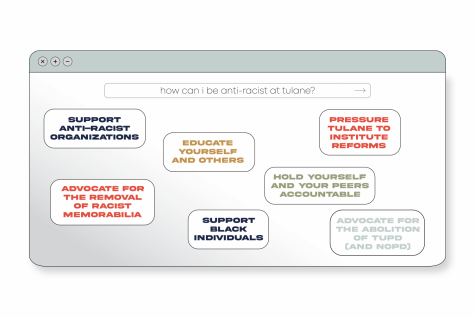How to be anti-racist at a racist institution
February 25, 2021

Tulane University, like many institutions of higher education, works tirelessly to uphold a spotless reputation as a progressive center for the advancement of knowledge. Whether intentional or not, this reputation often overshadows its not-so-praiseworthy actions, past and present, with its racism being vastly under-addressed.
Tulane itself was formed from money given by Paul Tulane, which he inherited from his father’s business that employed Haitian slave labor. Its ties to slavery are further memorialized through the impressive admissions building Gibson Hall, named after the Confederate soldier and anti-abolitionist Randall Lee Gibson. Racist trends have come to light recently as well, as Tulane removed Dr. Princess Dennar, a Black woman, from her role as director of the Medicine-Pediatrics residency program soon after she filed a lawsuit for gender and racial discirmination.
Therefore, for students part of a racist institution, it is of utmost importance to be actively anti-racist. Below is a curated action plan for anti-racism that students, faculty and staff, and, in reality, everyone should follow.
- Support anti-racist organizations
Active engagement in public anti-racist efforts, including advocating for the revision of racist policies and the institution of anti-racist policies, is essential to dismantle systemic racism on campus and in New Orleans. This can be done through donations, volunteering or spreading their message to others.
As a Tulane student, you can join Students Organizing Against Racism to combat issues of racism at Tulane here: https://tulane.campuslabs.com/engage/organization/students-organizing-against-racism.
Students can also join or support the Tulane Black Student Union as they provide BIPOC students a supportive framework while working with the administration to provide equity and equality. https://tulane.campuslabs.com/engage/organization/tulane-black-student-union
- Educate yourself and others
Expand your knowledge of BIPOC issues through independent research, checking your information bias through multiple sources and spreading that knowledge to others. When learning about individual BIPOC experiences with prejudice and discrimination, understand that the experiences may differ, and work to eliminate all kinds of bigotry. Likewise, learn about different types of racism and how they affect multiple facets of BIPOCs’ lives.
A podcast called Black Feminist Rants, hosted by Tulane student LaKia Williams, highlights the Black feminist experience and expands on topics of reproductive justice; you can listen here: https://www.blackfeministrants.com/
In New Orleans, the Deep South Center is a nonprofit which utilizes research, community engagement and education of environmental justice to improve the lives of those affected by pollution and climate change. https://www.dscej.org/our-story
- Support Black individuals
Institutionalized and systemic racism has formed barriers against the representation of Black culture in many areas of life. To challenge these barriers at a non-policy level, invest in Black work, art and businesses, whether on campus or around the city. New Orleans has a myriad of Black-owned restaurants, attractions and shops; lists of them can be found here: https://www.neworleans.com/things-to-do/multicultural/black-owned-businesses-in-new-orleans/
- Hold yourself and your peers accountable
The recognition and correction of any prejudiced thoughts or actions you are confronted with is essential to being anti-racist. Unaddressed bigotry can become so commonplace that it is no longer perceived as an issue of race. While the confrontation of your peers or yourself with racist acts may be uncomfortable, it is essential to eliminating bigotry of all forms. At Tulane, Greek organizations and students which have participated in hate speech or discriminatory/offensive actions have to be held accountable by each other and the administration in support of BIPOC students.
- Advocate for the removal of racist memorabilia
Statues, buildings and artifacts with ties to racism are not useful-to-preserve aspects of American history. Instead, they serve as offenses to the people which they harmed and marginalized. Faculty at Tulane unofficially renamed F. Edward Herbert Hall, named after the segregationist and former U.S. Representative, to Gwendolyn Midlo Hall Building. Midlo was an activist and historian of slavery. Tulane needs to continue this trajectory by changing the Gibson building name and the university’s name itself. The organization Take ‘Em Down NOLA also works to remove any physical representations of white supremacy in New Orleans. https://www.facebook.com/TakeEmDownNOLA/
- Advocate for the abolition of TUPD (and NOPD)
As police brutality rises to the forefront of BIPOC issues, calls for methods of safety and insurance of community well-being that omit the use of a police force have swept the nation. The Tulane administration, on the other hand, has ignored these efforts. They recently released a statement confirming their support of TUPD and continued to increase TUPD presence with a new police station on the corner of Broadway and Zimple streets. Abolish TUPD is a Tulane student-run organization working to dismantle this police force and give BIPOC students better protections and peace of mind through other means of safety enforcement. https://linktr.ee/abolishtupd
- Pressure Tulane to institute reforms
Tulane’s history of racism necessitates full transparency and responsibility as reparations for the harms it has committed and continues to commit against BIPOC students, faculty and, staff, and residents of New Orleans. Tulane has not yet released a public statement regarding any prejudice or racism it has committed despite pressure from students and the initiative from other universities, and it has not yet complied with the list of demands the Tulane BSU released prior to the start of the fall 2020 semester. Therefore, to ensure the university follows through with creating a more inclusive community and provides equity, we must hold the people in power at Tulane accountable.









Educated Student • Feb 27, 2021 at 1:43 pm
Whoever wrote this article must be out of brain cells if you think TUPD is racist. TUPD serves to uphold the safety and security of our community and for that we should be grateful. Instead of smearing the organization, maybe you should offer condolences to force and the officer’s family who just lost his life to protect people like me and you. This is really a sick article smearing each and every officer that puts their lives on the line each day to protect YOU and all of your ungrateful communist supporters. Really showed your true colors by making such accusations against a group of people implicating that they are all racists pigs and the officer who lost his life protecting the citizens of New Orleans was no better. Have some respect and gratitude for these people and their families.
I hope you wake up to reality one day. Crime is up 90% in New Orleans, it is an absolute war zone outside of the little socialist bubble you live in. With the economy shut down and no jobs in the city (thanks Latoya), people are resorting to car jacking, armed robberies and murders. If TUPD seizes to exist, so will Tulane because no parent in their right mind would send their kid here.
Graham Willis • Feb 25, 2021 at 1:10 pm
This is awesome and I hope people who read this take her suggestions to heart.